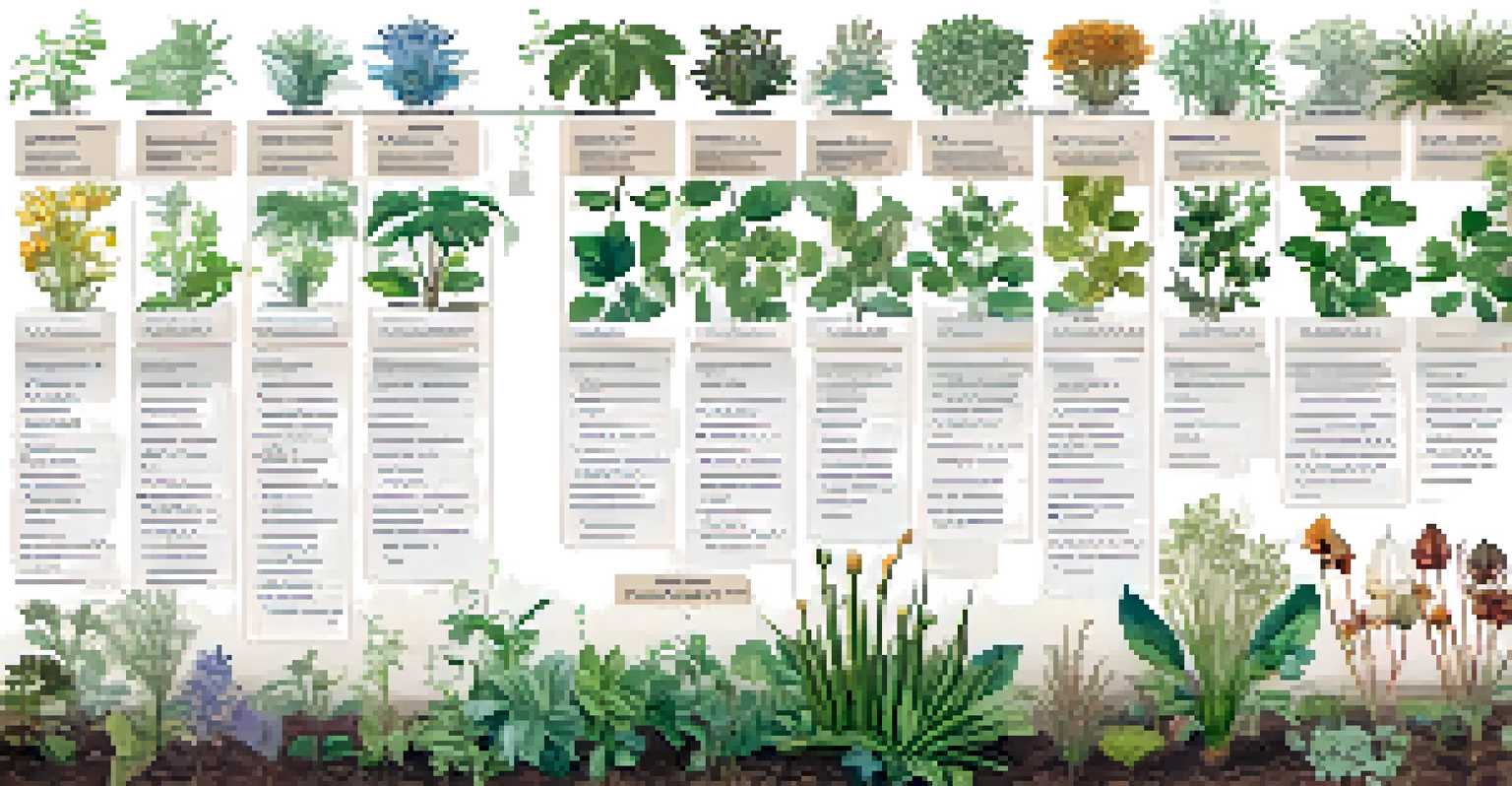Impact of Climate Change on Plant Taxonomy and Classification

The Basics of Plant Taxonomy and Its Importance
Plant taxonomy is the science of naming, describing, and classifying plants. It provides a framework that helps scientists and researchers communicate about plant species. This classification system is crucial for understanding biodiversity and ecosystems.
Plants are the earth's endless source of beauty and life, but they are also an essential part of our ecosystem that needs protecting.
For instance, knowing the taxonomy of a plant can reveal its evolutionary relationships and ecological roles. This knowledge is vital for conservation efforts, agricultural practices, and even medicine, as many drugs are derived from plants.
However, as the climate continues to change, the very foundation of plant taxonomy is being challenged, leading to new questions and considerations in the field.
How Climate Change Affects Plant Habitats
One of the most immediate impacts of climate change is the alteration of habitats. Rising temperatures, shifting rainfall patterns, and increased frequency of extreme weather events can drastically change the environments where plants grow.

For example, a species that thrives in a specific climate may find itself struggling to survive as its habitat becomes unsuitable. This can lead to shifts in distribution, where plants must migrate to new areas or face extinction.
Climate Change Alters Plant Habitats
Rising temperatures and shifting weather patterns are changing the environments where plants thrive, prompting a need for taxonomic reevaluation.
As habitats change, the classification of plants also needs to adapt, requiring taxonomists to reevaluate existing categorizations and relationships.
Species Adaptation and Evolution Under Climate Stress
Plants have remarkable abilities to adapt to their environments, but climate change poses unprecedented challenges. Rapid changes can outpace a species' ability to evolve, leading to significant changes in taxonomic classifications.
We won't have a society if we destroy the environment.
For instance, some plant species may develop new traits that allow them to survive in altered climates, leading to the emergence of new subspecies or even entirely new species. This process can blur the lines of existing classifications.
Taxonomists must then revise their understanding of these plants, which can complicate conservation strategies and biodiversity assessments.
The Role of Genetic Studies in Taxonomy
Genetic studies are becoming increasingly important in plant taxonomy, especially in the context of climate change. By examining the DNA of plants, scientists can uncover relationships that aren't immediately apparent through traditional classification methods.
As climate change pushes species into new territories, genetic studies can help identify which plants are closely related and how they may adapt. This information is crucial for understanding how biodiversity might shift in response to changing conditions.
Genetic Studies Enhance Classification
Advancements in genetic research are helping taxonomists understand plant relationships and adaptations in the face of climate change.
Moreover, genetic data can reveal how certain plants are evolving traits that allow them to thrive in new environments, prompting taxonomists to adjust classifications based on these findings.
Impact of Invasive Species on Plant Taxonomy
Climate change can facilitate the spread of invasive species, which can disrupt local ecosystems and alter plant classifications. Invasive plants may outcompete native species, leading to declines in biodiversity.
For example, an invasive species may occupy the niche of a native plant, forcing the native to adapt, migrate, or perish. This shift can change the ecological relationships and taxonomic classifications within that ecosystem.
As a result, taxonomists must consider not only the native flora but also the impact of these invasive species on existing classifications and ecosystem health.
The Importance of Long-term Monitoring in Taxonomy
Long-term ecological monitoring is essential for understanding the impacts of climate change on plant species. By continuously observing plant populations, scientists can track changes in distribution, abundance, and phenology.
This data is invaluable for taxonomists who need to update classifications and understand how plants are responding to climate pressures over time. For example, shifts in blooming times can indicate how plants are adapting to new climate realities.
Collaboration is Key for Conservation
A united effort among scientists, conservationists, and policymakers is essential to effectively address the impacts of climate change on plant taxonomy.
Such monitoring efforts can also inform conservation strategies, ensuring that efforts are focused on the most vulnerable species and ecosystems.
Collaborative Approaches to Taxonomy in a Changing World
Addressing the impact of climate change on plant taxonomy requires collaboration among scientists, conservationists, and policymakers. By sharing data and insights, these groups can develop a comprehensive understanding of how climate change affects plant life.
Collaborative efforts can lead to more effective conservation strategies, ensuring that resources are allocated where they are most needed. For instance, joint projects can focus on protecting areas that serve as refuges for vulnerable species.

Ultimately, a united approach will enhance our ability to adapt taxonomic practices to the realities of a changing climate.
Future Directions in Plant Taxonomy and Climate Change
As we move forward, the intersection of climate change and plant taxonomy will become increasingly vital. Taxonomists will need to embrace new technologies, such as genetic sequencing and remote sensing, to stay ahead of the changes.
Additionally, interdisciplinary research that combines climate science, ecology, and taxonomy will be crucial for creating effective strategies. This holistic approach can help ensure that plant classifications reflect the current state of biodiversity.
By adapting to the challenges posed by climate change, the field of plant taxonomy can play a key role in preserving our planet's flora for future generations.